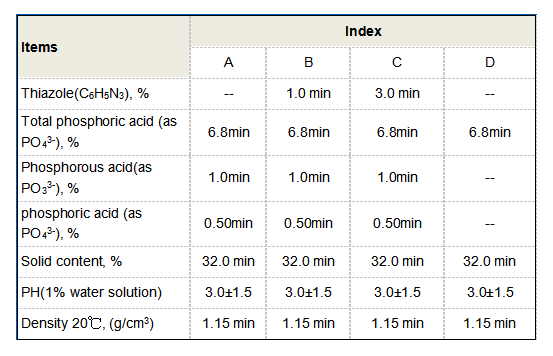Jul . 10, 2024 20:55
Back to list
Scale and corrosion prevention in cooling towers with inhibitor for optimal efficiency.
Scale and corrosion are two common issues that can arise in cooling towers and other water systems. Scale refers to the buildup of minerals such as calcium and magnesium on surfaces, while corrosion is the deterioration of metal components due to chemical reactions. Both of these problems can lead to decreased efficiency, higher energy costs, and potential equipment damage if not addressed promptly.
To prevent scale and corrosion in cooling towers, it is essential to use a scale and corrosion inhibitor. These inhibitors are chemicals that are added to the water to help prevent the formation of scale and the corrosion of metal components. They work by forming a protective barrier on the surfaces of the system, preventing minerals from depositing and corrosive reactions from occurring.
There are several types of scale and corrosion inhibitors available, including phosphonates, polyphosphates, and organic inhibitors. Each type has its unique characteristics and is suitable for different types of water systems and operating conditions. For example, phosphonates are effective in high-temperature systems, while polyphosphates are better suited for low-temperature systems. Organic inhibitors, on the other hand, are environmentally friendly and can be used in a wide range of conditions.
When selecting a scale and corrosion inhibitor for a cooling tower, it is essential to consider several factors, such as water quality, system design, operating conditions, and budget

scale and corrosion inhibitor for cooling tower. A water analysis should be conducted to determine the types and levels of minerals present in the water, as this will help determine the most suitable inhibitor. The system design, including material of construction and flow rates, will also influence the choice of inhibitor. Additionally, operating conditions such as temperature, pH, and concentration levels should be taken into account to ensure the inhibitor's effectiveness. In addition to using a scale and corrosion inhibitor, regular monitoring and maintenance of the cooling tower are essential to prevent scale and corrosion problems. This includes routine inspections, cleaning, and water treatment to ensure the inhibitor is working correctly and the system is functioning optimally. It's also essential to follow the manufacturer's guidelines for the inhibitor and adhere to any regulatory requirements regarding water treatment. In conclusion, scale and corrosion inhibitors are essential components of any cooling tower water treatment program. By using the appropriate inhibitor and following best practices for maintenance and monitoring, scale and corrosion issues can be minimized, and the efficiency and longevity of the cooling tower can be maintained. Investing in a quality inhibitor and proper water treatment is a small price to pay compared to the potential costs of scale and corrosion-related problems down the line.

scale and corrosion inhibitor for cooling tower. A water analysis should be conducted to determine the types and levels of minerals present in the water, as this will help determine the most suitable inhibitor. The system design, including material of construction and flow rates, will also influence the choice of inhibitor. Additionally, operating conditions such as temperature, pH, and concentration levels should be taken into account to ensure the inhibitor's effectiveness. In addition to using a scale and corrosion inhibitor, regular monitoring and maintenance of the cooling tower are essential to prevent scale and corrosion problems. This includes routine inspections, cleaning, and water treatment to ensure the inhibitor is working correctly and the system is functioning optimally. It's also essential to follow the manufacturer's guidelines for the inhibitor and adhere to any regulatory requirements regarding water treatment. In conclusion, scale and corrosion inhibitors are essential components of any cooling tower water treatment program. By using the appropriate inhibitor and following best practices for maintenance and monitoring, scale and corrosion issues can be minimized, and the efficiency and longevity of the cooling tower can be maintained. Investing in a quality inhibitor and proper water treatment is a small price to pay compared to the potential costs of scale and corrosion-related problems down the line.
Share
Latest news
-
Understanding Polycarboxylic Acids: Properties, Applications, and Future PotentialNewsJul.28,2025
-
Scale Inhibitor Explained: How to Protect Your System from Limescale and Hard Water DamageNewsJul.28,2025
-
Scale and Corrosion Inhibitors: Essential Chemicals for Industrial Water System ProtectionNewsJul.28,2025
-
Polyaspartic Acid: A Biodegradable Polymer for Sustainable ChemistryNewsJul.28,2025
-
Isothiazolinones: A Versatile Antimicrobial Class with Industrial Power and Regulatory ChallengesNewsJul.28,2025
-
A Deep Dive into 2-Phosphonobutane-1,2,4-Tricarboxylic Acid (PBTC)NewsJul.28,2025





